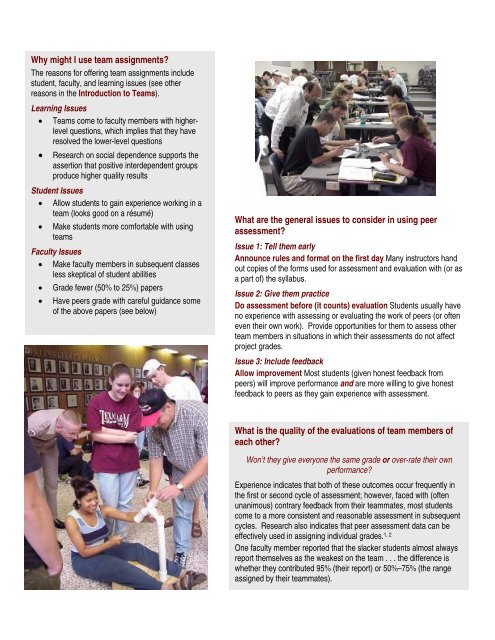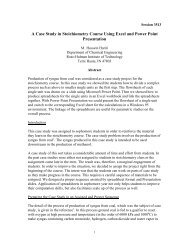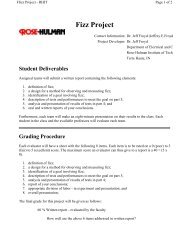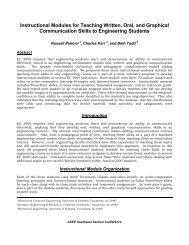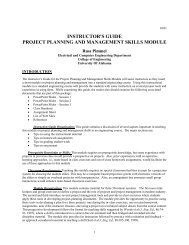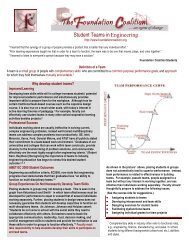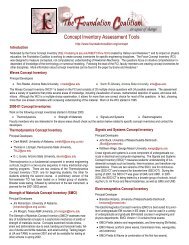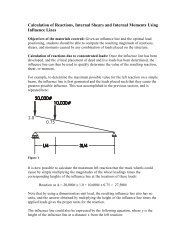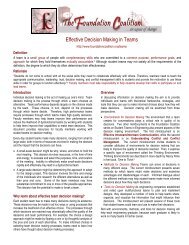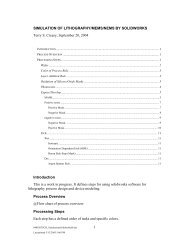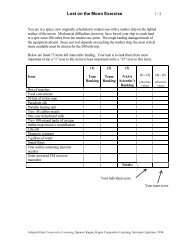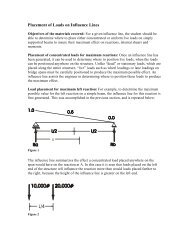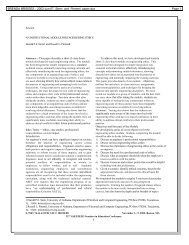Peer Assessment and Peer Evaluation - Foundation Coalition
Peer Assessment and Peer Evaluation - Foundation Coalition
Peer Assessment and Peer Evaluation - Foundation Coalition
Create successful ePaper yourself
Turn your PDF publications into a flip-book with our unique Google optimized e-Paper software.
Why might I use team assignments?<br />
The reasons for offering team assignments include<br />
student, faculty, <strong>and</strong> learning issues (see other<br />
reasons in the Introduction to Teams).<br />
Learning Issues<br />
• Teams come to faculty members with higherlevel<br />
questions, which implies that they have<br />
resolved the lower-level questions<br />
• Research on social dependence supports the<br />
assertion that positive interdependent groups<br />
produce higher quality results<br />
Student Issues<br />
• Allow students to gain experience working in a<br />
team (looks good on a résumé)<br />
• Make students more comfortable with using<br />
teams<br />
Faculty Issues<br />
• Make faculty members in subsequent classes<br />
less skeptical of student abilities<br />
• Grade fewer (50% to 25%) papers<br />
• Have peers grade with careful guidance some<br />
of the above papers (see below)<br />
What are the general issues to consider in using peer<br />
assessment?<br />
Issue 1: Tell them early<br />
Announce rules <strong>and</strong> format on the first day Many instructors h<strong>and</strong><br />
out copies of the forms used for assessment <strong>and</strong> evaluation with (or as<br />
a part of) the syllabus.<br />
Issue 2: Give them practice<br />
Do assessment before (it counts) evaluation Students usually have<br />
no experience with assessing or evaluating the work of peers (or often<br />
even their own work). Provide opportunities for them to assess other<br />
team members in situations in which their assessments do not affect<br />
project grades.<br />
Issue 3: Include feedback<br />
Allow improvement Most students (given honest feedback from<br />
peers) will improve performance <strong>and</strong> are more willing to give honest<br />
feedback to peers as they gain experience with assessment.<br />
What is the quality of the evaluations of team members of<br />
each other?<br />
Won’t they give everyone the same grade or over-rate their own<br />
performance?<br />
Experience indicates that both of these outcomes occur frequently in<br />
the first or second cycle of assessment; however, faced with (often<br />
unanimous) contrary feedback from their teammates, most students<br />
come to a more consistent <strong>and</strong> reasonable assessment in subsequent<br />
cycles. Research also indicates that peer assessment data can be<br />
effectively used in assigning individual grades. 1, 2<br />
One faculty member reported that the slacker students almost always<br />
report themselves as the weakest on the team . . . the difference is<br />
whether they contributed 95% (their report) or 50%–75% (the range<br />
assigned by their teammates).


